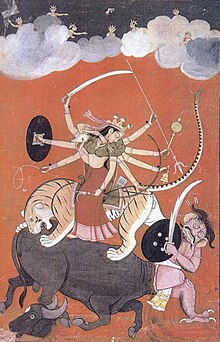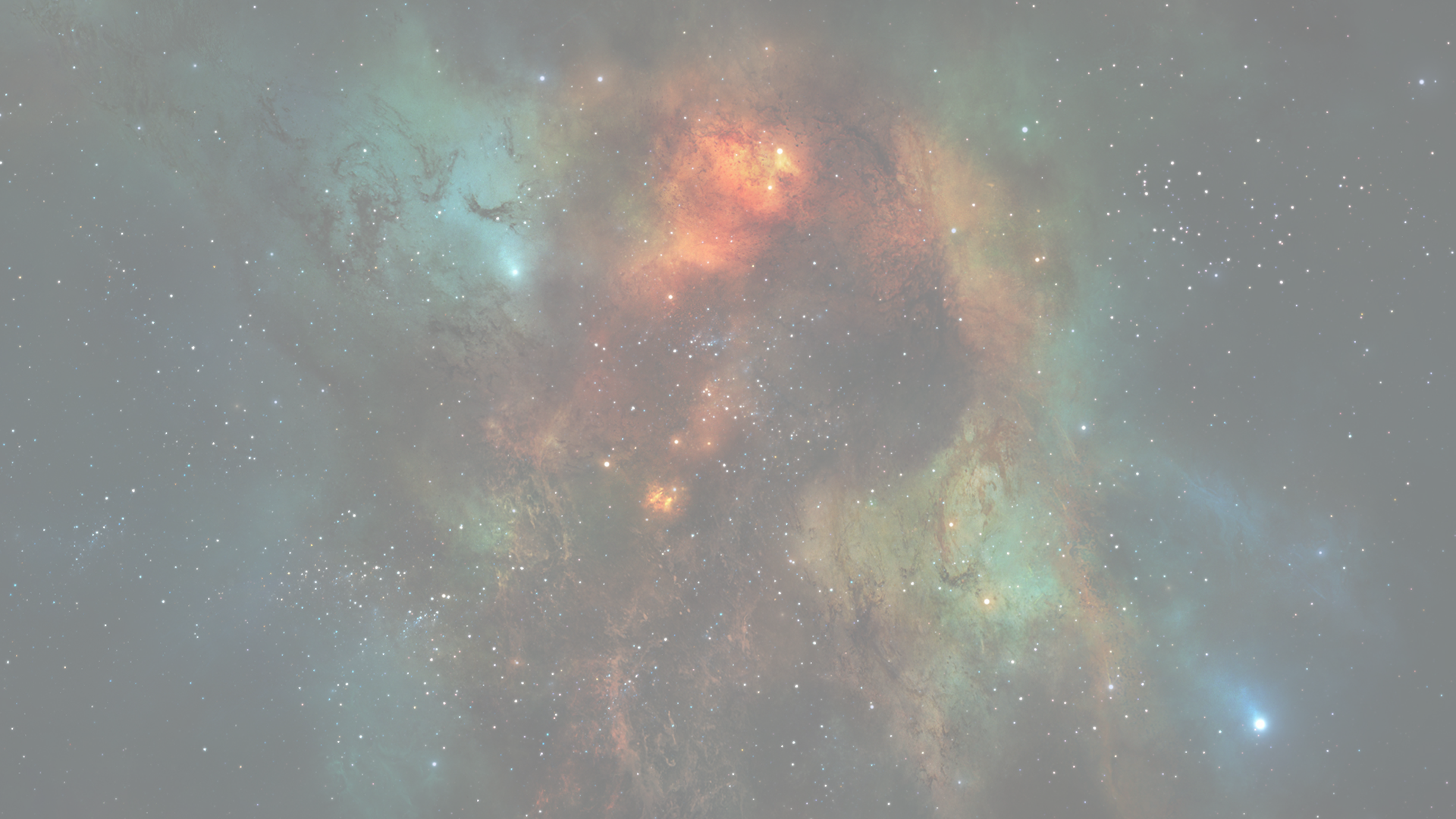

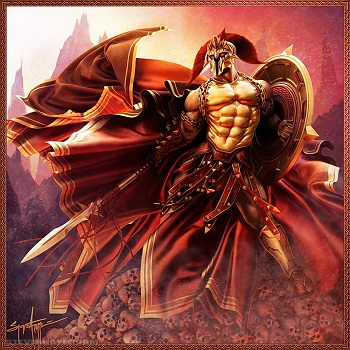
Rough Notes:
List of war deities
|
|
[hide]This article has multiple issues. Please help improve it or discuss these issues on the talk page. (Learn how and when to remove these template messages)
|
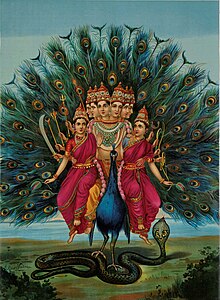
Kartikeya, Hindu god of war
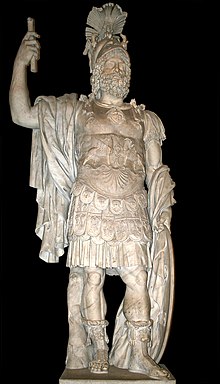
Mars, the Roman god of war
A war deity is a god or goddess in mythology associated with war, combat, or bloodshed. They occur commonly in both monotheistic and polytheistic religions.
Unlike most gods and goddesses in polytheistic religions, monotheistic deities have traditionally been portrayed in their mythologies as commanding war in order to spread their religion. (The intimate connection between "holy war" and the "one true god" belief of monotheism has been noted by many scholars; including Jonathan Kirsch in his book God Against The Gods: The History of the War Between Monotheism and Polytheism and Joseph Campbell in The Masks of God, Vol. 3: Occidental Mythology.) [1][2]
The following is a partial list of war deities.
Contents
[hide]
- 1African mythology
- 2Armenian mythology
- 3Aztec mythology
- 4Baltic mythology
- 5Berber mythology
- 6Celtic mythology
- 7Chinese mythology
- 8Continental Germanic mythology
- 9Egyptian mythology
- 10Etruscan mythology
- 11Greek mythology
- 12Hawaiian mythology
- 13Hinduism
- 14Hittite mythology
- 15Hungarian mythology
- 16Japanese mythology
- 17Lusitanian mythology
- 18Māori mythology
- 19Maya mythology
- 20Mesopotamian mythology
- 21Mongolian shamanism
- 22Native American mythology
- 23Norse mythology
- 24Nuristani mythology
- 25Paleo-Balkan mythology
- 26Polynesian mythology
- 27Roman mythology
- 28Semitic mythology
- 29Slavic mythology
- 30Turco-Mongol mythology
- 31Vietnamese mythology
- 32Vodou
- 33References
African mythology[edit]
- Agurzil, Berber god of war
- Apedemak, Nubian lion-headed warrior god
- Kokou, powerful Yoruba warrior god
- Maher, Ethiopian god of war
- Ogoun, Yoruba deity who presides over fire, iron, hunting, politics, and war
- Oya, Yoruba warrior-goddess of the Niger River
Armenian mythology[edit]
- Anahit, goddess of fertility, birth, beauty, and water; in early periods associated with war
Aztec mythology[edit]
- Patterns of War
- Mixcoatl, god of war and hunting.
- Xipe-Totec, god of force, patron of war, agriculture, vegetation, diseases, seasons, rebirth, hunting, trades, and Spring, the lord of the East.
- Tlaloc, god of thunder, rain, and earthquakes.
- Xiuhtecuhtli, god of fire.
- Huitzilopochtli, god of will, patron of war, fire, and sun, the lord of the South.
Baltic mythology[edit]
- Kara Māte, Latvian goddess of war
- Kauriraris, Lithuanian god of war and war steeds
- Kovas, Lithuanian god of war
Berber mythology[edit]
- Gurzil, war god
- Ifri, war goddess
Celtic mythology[edit]
- Agrona, reconstructed Proto-Celtic name for the river Aeron in Wales, and possibly the name of an associated war goddess
- Andarta, Brittonic goddess theorised to be associated with victory, overcoming enemies, war
- Alaisiagae, a pair of goddesses worshiped in Roman Britain, with parallel Celtic and Germanic titles
- Andraste, Gaulish warrior goddess
- Anann, Irish goddess of war, death, predicting death in battle, cattle, prosperity, and fertility
- Bandua, Gallaecian God of War
- Badb, Irish goddess of war who took the form of a crow; member of the Morrígan
- Belatucadros, war god worshipped by soldiers and equated with the Roman war god Mars
- Camulus, god of war of the Belgic Remi and British Trinovantes
- Catubodua, Gaulish goddess assumed to be associated with victory
- Cicolluis, Gaulish and Irish god associated with war
- Cocidius, Romano-British god associated with war, hunting and forests
- Macha, Irish goddess associated with war, horses, and sovereignty; member of the Morrígan
- The Morrígan, Irish triple goddess associated with sovereignty, prophecy, war, and death on the battlefield
- Neit, Irish god of war, husband of Nemain of Badb
- Nemain, Irish goddess of the frenzied havoc of war; member of the Morrígan
- Rudianos, Gaulish god of war
- Segomo, Gaulish god of war
- Teutates, British and Gaulish god of war and the tribe
Chinese mythology[edit]
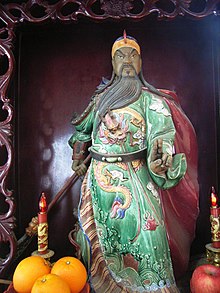
Guan Yu, Chinese god of loyalty, righteousness, and valor
- Jiutian Xuannü, goddess of war, sexuality, and longevity[3]
- Chiyou, God of War
- Yang Jian, Three Eyed Warrior
- Jinzha, Marshal of the Center Altar
- Muzha, Marshal of the Center Altar
- Li Jing, Heavenly King & Holder of the Pagoda.
- Wen Qiong[4]
- Nezha (the family name Li come from his father, Li Jing)
- Guan Yu, god of Loyalty, righteousness, and valor
- Yue Fei
Continental Germanic mythology[edit]
- Baduhenna, a western-Frisii goddess of warfare
- Wōden, god associated with wisdom, war, battle, and death, as well as also magic, poetry, prophecy, victory, and the hunt
Egyptian mythology[edit]

Sekhmet, Egyptian warrior goddess
- Anhur, god of war
- Bast, cat-headed goddess associated with war, protection of Lower Egypt and the pharaoh, the sun, perfumes, ointments, and embalming
- Horus, god of the king, the sky, war, and protection
- Maahes, lion-headed god of war
- Menhit, goddess of war, "she who massacres"
- Montu, falcon-headed god of war, valor, and the Sun
- Neith, goddess of war, hunting, and wisdom
- Pakhet, goddess of war
- Satis, deification of the floods of the Nile River and an early war, hunting, and fertility goddess
- Sekhmet, goddess of warfare, pestilence, and the desert
- Set, god of chaos, associated with war
- Sobek, god of the Nile, the army, military, fertility and of crocodiles
- Sopdu, god of the scorching heat of the summer sun, associated with war
- Wepwawet, wolf-god of war and death who later became associated with Anubis and the afterlife
Etruscan mythology[edit]
Greek mythology[edit]
- Alala, spirit of the war cry
- Alke, spirit of courage and battle-strength
- Amphillogiai, goddesses of disputes
- Androktasiai, spirits of battlefield slaughter
- Ares, god of war, bloodlust, weapons of war, the defence and sacking of cities, rebellion, civil order, banditry, manliness, and courage; the son of Zeus and Hera
- Athena, goddess of wisdom, war strategy, heroic endeavour, handicrafts, and reason
- Bia, spirit of force and compulsion
- Deimos, personification of terror
- Enyalius, god of battle
- Enyo, goddess of war
- Eris, goddess of discord, chaos and strife
- Homados, spirit of the din of battle
- Hysminai, female spirits of fighting and combat
- Ioke, spirit of onslaught, battle-tumult, and pursuit
- Keres, female spirits of violent or cruel death, including death in battle, by accident, murder, or ravaging disease
- Kratos, the personification of strength and power
- Kydoimos, spirit of the din of battle
- Makhai, male spirits of fighting and combat
- Nike, spirit of victory
- Palioxis, spirit of backrush, flight, and retreat from battle
- Pallas, Titan god of warcraft and of the springtime campaign season
- Perses, the Titan of destruction
- Phobos, spirit of panic, fear, flight, and battlefield route
- Phonoi, spirits of murder, killing, and slaughter
- Polemos, spirit of war
- Proioxis, spirit of onrush and battlefield pursuit
Hawaiian mythology[edit]
Hinduism[edit]
- Chamunda, Goddess of war and disease
- Durga, The fiercer, demon-fighting form of Shiva's wife, the goddess Parvati
- Hanuman, God associated with war, wisdom, and courage
- Indra, God of war, storms, and rainfall
- Kali, Goddess associated with time, change, and war
- Kartikeya, God of war and battle
- Kathyayini, Goddess of vengeance and victory
- Mangala, God of war
- Matrikas, Goddesses of war, children, and emancipation
- Parasurama, Axe God "Rama with an axe", God of war and battle,
- Shiva, God of avenging and destroying
- Bhaargava, The axe warrior a.k.a. Parashurama
- Yama, God of Death
- Narasimha, God of Justice
- Ganesha, Heroically taking action against demons
- Kalki, Destroyer of foulness, darkness and ignorance
- Virabhadra, The God of Warriors
- Nirrti, Goddess of Strife
- Rama, God associated with War, Justice, Kingship
- Krishna, God of strategies of War
Hittite mythology[edit]
- Shaushka, goddess of fertility, war, and healing
- Wurrukatte, god of war
Hungarian mythology[edit]
- Hadúr, god of war and the metalsmith of the gods
Japanese mythology[edit]
- Hachiman Daimyōjin, Shinto god of war (on land) and agriculture, divine protector of the Minamoto clan and Imperial Dynasty ownership of Japan
- Takemikazuchi-no-kami, god of war, conquest, martial arts, Sumo, and lightning; general of the Amatsukami; god of Kashima and Ujigami of Nakatomi clan
- Futsunushi, god of swords, martial arts, and conquest; god of the Mononobe clan
- Sarutahiko Ōkami, deity of war and misogi; the Great God who stands at the junction of Heaven and Earth; one of the main Kunitsukami; actively worshipped by Ueshiba Morihei
- Suwa Myōjin (Takeminakata-no-kami), god of valor and duty, protector of Japanese religion
- Bishamonten, armor-clad god of war
Lusitanian mythology[edit]
- Neto, god believed to be associated with war, death, and weaponry

Inanna, Mesopotamian goddess of sexual love, fertility, and warfare
Māori mythology[edit]
- Tūmatauenga, god of war
Maya mythology[edit]
- Tohil, god associated with fire, the sun, rain, mountains and war
Mesopotamian mythology[edit]
- Belus, Babylonian god of war
- Inanna, Sumerian goddess of sexual love, fertility, and warfare
- Ishtar, Assyrian and Babylonian counterpart to Inanna
- Nergal, Babylonian god of war, fire, the underworld, and pestilence
- Pap-nigin-gara, Akkadian and Babylonian god of war
- Sebitti, group of minor Akkadian and Babylonian war gods
- Shala, Akkadian and Babylonian goddess of war and grain
- Shara, minor Sumerian god of war
- Shulmanu, god of the underworld, fertility, and war
Mongolian shamanism[edit]
Native American mythology[edit]
- Qamaits, Nuxálk warrior goddess
- Winalagalis, Kwakwaka'wakw god of war
Norse mythology[edit]
- Freyja, goddess associated with love, beauty, fertility, gold, seiðr, war, and death
- Odin, god associated with wisdom, war, battle, and death
- Thor, god associated with thunder, strength, defense, oaks, goats, lightning, storms, weather, crops, trading voyages, courage, trust, revenge, protection, warfare, and battles
- Týr, god associated with honor, law (the "Allthing"), justice in battle, victory, and heroic glory
- Ullr, god associated with archery, male beauty, skiing, winter sports, single combat, and war
Nuristani mythology[edit]
- Great Gish, god of war
Paleo-Balkan mythology[edit]
- Thracian Rider
- Sabazios
- Danubian Rider
Polynesian mythology[edit]
- 'Oro, god of war
Roman mythology[edit]
- Bellona, goddess of war
- Honos, god of chivalry, honor, and military justice
- Mars, god of war and agriculture, equivalent to the Greek god Ares
- Minerva, goddess of wisdom and war, equivalent to the Greek goddess Athena
- Nerio, warrior goddess and personification of valor
- Victoria, personification of victory, equivalent to the Greek goddess Nike
- Virtus, god of bravery and military strength
Semitic mythology[edit]
- Agasaya, "the Shrieker", goddess of war
- Anat, goddess of war
- Astarte, goddess of fertility, sexuality, and war, associated with the Mesopotamian Ishtar or Inanna
- Resheph, god of plague and war
- Tanit, Phoenician lunar goddess associated with war
Slavic mythology[edit]
- Jarovit, god of vegetation, fertility, and spring, also associated with war and harvest
- Perun, god of thunder and lightning, associated with war
- Radegast, West Slavic god of hospitality, fertility and crops, associated with war and the sun; may or may not have been worshipped by ancient Slavs
- Svetovid, god of war, fertility, and abundance
- Zorya Utrennyaya, goddess of the morning star, sometimes depicted as a warrior goddess who protected men in battle
- Serbon, Illyrian god of fertility and war
Turco-Mongol mythology[edit]
- Kyzaghan, Turkic deity of war
Vietnamese mythology[edit]
- Thánh Gióng, god of triumph over foreign invaders
- Thần Đồng Cổ, the armored protector of Lý dynasty.
- Độc Cước, the protector of coastal settlements. Legend has it that he split himself in two with his axe, each half guards coastal villages against sea ogres.
- Cao Lỗ, god of military innovations.
Vodou[edit]
- Ogoun, loa who presides over fire, iron, hunting, politics, and war
References[edit]
- Jump up^ Kirsch, J. (2004). God Against the Gods: The History of the War Between Monotheism and Polytheism. Viking Compass. ISBN 9780670032860. Retrieved 2015-06-22.
- Jump up^ "Occidental Mythology (Masks of God): Joseph Campbell: 9780140194418: Amazon.com: Books". amazon.com. Retrieved 2015-06-22.
- Jump up^ Cahill, Suzanne E. (18 July 2013). "Sublimation in Medieval China: The Case of the Mysterious Woman of the Nine Heavens". Journal of Chinese Religions. 20 (1): 91–102. doi:10.1179/073776992805307692.
- Jump up^ http://etheses.lib.cuhk.edu.hk/pdf/004777762.pdf
Greek Mythology The Titans History >> Ancient Greece >> Greek Mythology The Titans were the Greek gods that ruled the world before the Olympians. The first twelve Titans were the children of the original gods Uranus (Father Sky) and Gaia (Mother Earth). The Original Twelve Titans Cronus - The leader of the Titans and the god of time. Rhea - Cronus' wife and queen of the Titans. She ruled over motherhood and fertility. Oceanus - He represented the sea and was the eldest of the Titans. Tethys - A sea goddess who was married to Oceanus. Hyperion - The Titan of light and the father of the sun god Helios. Theia - Goddess of brightness and shining. She was married to Hyperion. Coeus - Titan of intelligence and the stars. Phoebe - Goddess of brightness and intelligence. She was the mother of Leto. Mnemosyne - She represented memory in Greek Mythology. She was the mother of the Muses (Zeus was the father). Themis - She ruled over law and order. She was mother to the Fates and the Hours (Zeus was the father). Crius - The Titan of heavenly constellations. Lapetus - The god of mortality. He fathered some of the most powerful of the Titan children including Atlas and Prometheus. Famous Titan Children Some of the children of the Titans were also famous gods in Greek mythology. Here are a few of them: Atlas - After losing the war against Zeus, Atlas was punished by having to hold up the heavens on his shoulders. He is often shown holding the Earth. Helios - Helios was the god of the sun. He drove the chariot of the sun across the sky each day. Prometheus - Prometheus is known in Greek mythology as the creator of mankind. He also gave mankind the gift of fire from Mount Olympus. Leto - Leto is famous for being the mother of the twin Olympian gods Apollo and Artemis. Zeus and the Olympians The leader of the Titans, Cronus, was told in a prophecy that his sons would one day overthrow him. In order to protect himself, each time his wife Rhea had a child he would swallow it. He swallowed several children including Hestia, Hades, Hera, Poseidon, and Demeter. However, when Zeus was born, Rhea hid Zeus in a cave and gave Cronus a stone to swallow instead. Once Zeus was born he forced his father to spit up his siblings. The Titanomachy Once Zeus had freed his siblings, they went to war against the Titans. They gained some valuable allies including the one-eyed Cyclopes and some huge hundred-headed monsters called the Hecatoncheires. The two sides waged war for ten years. Eventually, Zeus and his siblings won the war. They imprisoned the Titans in a deep chasm in the Underworld called Tartarus. Interesting Facts About the Titans The female Titans remained neutral during the war and were not sent to Tartarus. Some of them even had children with Zeus. The element "titanium" is named after the Titans of Greek mythology. Some of the younger Titans allied with Zeus during the war. The word "titan" has come to mean something that is large or strong. The largest moon of the planet Saturn is named Titan. After winning the war, Zeus and his brothers (Hades and Poseidon) divided up the world: Zeus took the sky, Poseidon the sea, and Hades the Underworld. The Earth was a shared domain of all three. Activities Take a ten question quiz about this page. Listen to a recorded reading of this page: For more about Ancient Greece: Overview Timeline of Ancient Greece Geography The City of Athens Sparta Minoans and Mycenaeans Greek City-states Peloponnesian War Persian Wars Decline and Fall Legacy of Ancient Greece Glossary and Terms Arts and Culture Ancient Greek Art Drama and Theater Architecture Olympic Games Government of Ancient Greece Greek Alphabet Daily Life Daily Lives of the Ancient Greeks Typical Greek Town Food Clothing Women in Greece Science and Technology Soldiers and War Slaves People Alexander the Great Archimedes Aristotle Pericles Plato Socrates 25 Famous Greek People Greek Philosophers Greek Mythology Greek Gods and Mythology Hercules Achilles Monsters of Greek Mythology The Titans The Iliad The Odyssey The Olympian Gods Zeus Hera Poseidon Apollo Artemis Hermes Athena Ares Aphrodite Hephaestus Demeter Hestia Dionysus Hades Works Cited History >> Ancient Greece >> Greek Mythology
Read more at: https://www.ducksters.com/history/ancient_greece/titans.php
This text is Copyright © Ducksters. Do not use without permission.
Titan (mythology)
| Greek deities series |
|---|
| Titans |
|
In Greek mythology, the Titans (Greek: Τιτάν, Titán, plural: Τiτᾶνες, Titânes) and Titanesses (or Titanides; Greek: Τιτανίς, Titanís, plural: Τιτανίδες, Titanídes) were members of the second generation of divine beings, descending from the primordial deities and preceding the Olympian deities. Based on Mount Othrys, the Titans most famously included the first twelve children of the primordial Gaia (Mother Earth) and Uranus (Father Sky). They were giant deities of incredible strength, who ruled during the legendary Golden Age, and also comprised the first pantheon of Greek deities.
The first twelve Titans comprised the females Mnemosyne, Tethys, Theia, Phoebe, Rhea, and Themis and the males Oceanus, Hyperion, Coeus, Cronus, Crius, and Iapetus.
A second set of Titans consisted of Hyperion's children Helios, Selene, and Eos; Coeus' children Lelantos, Leto, and Asteria; Iapetus' sons Atlas, Prometheus, Epimetheus, and Menoetius; Oceanus' daughter Metis; and Crius' sons Astraeus, Pallas, and Perses.
Like Cronus overthrowing his father Uranus, the Titans were overthrown by Cronus's children (Zeus, Hades, Poseidon, Hestia, Hera and Demeter), in the Titanomachy (or "War of the Titans"). The Greeks may have borrowed this mytheme from the Ancient Near East.[1]
Contents
[hide]
Titanomachy[edit]
Greeks of the classical age knew several poems about the war between the Olympians and Titans. The dominant one, and the only one that has survived, was in the Theogony attributed to Hesiod. A lost epic, Titanomachia (attributed to the legendary blind Thracian bard Thamyris) was mentioned in passing in an essay On Music that was once attributed to Plutarch. The Titans also played a prominent role in the poems attributed to Orpheus. Although only scraps of the Orphic narratives survive, they show interesting differences with the Hesiodic tradition.
The classical Greek myths of the Titanomachy fall into a class of similar myths throughout Europe and the Near East concerning a war in heaven, where one generation or group of gods largely opposes the dominant one. Sometimes the elders are supplanted, and sometimes the rebels lose and are either cast out of power entirely or incorporated into the pantheon. Other examples might include the wars of the Æsir with the Vanir in Scandinavian mythology, the Babylonian epic Enuma Elish, the Hittite "Kingship in Heaven" narrative, the obscure generational conflict in Ugaritic fragments, Virabhadra's conquest of the early Vedic Gods, and the rebellion of Lucifer in Christianity. The Titanomachy lasted for ten years.[2] The Titans were imprisoned in Tartarus after the war had ended. Tartarus is said to be the deepest part of the Underworld and the place where the evilest beings are tortured for all eternity.
Genealogy[edit]
| [hide]Titan Family Tree [3] | |||||||||||||||||||||||||||||||||||||||||||||||||||||||||||||||||||||||||||||||||||||||||||||||||||||||||||||||||||||||||||||||||||||||||||||||||||||||||||||||||||||||||||||||||||||||||||||||||||||||||||||||||||||||||||||||||||||||||||||||||||||||||||||||||||||||||||||||||||||||||||||||||||||||||||||||||||||||||||||||||||||||||||||||||||||||||||||||||||||||||||||||||||||||||||||||||||||||||||||||||||||||||||||||||||||||||||||||||||||||||||||||||||||||||||||||||||||||||||||||||||||||||||||||||||||||||||||||||||||||||||||||||||||||||||||||||||||||||||||||||||||||||||||||||||||||||||||||||||||||||||||||||||||||||||||||||||||||||||||||||||||||||||||||||||||||||||||||||||||||||||||||||||||||||||||||||||||||||||||||||||||||||||||||||||||||||||||||||||||||||||||||||||||||||||||||||||||||||||||||||||||||||||||||||||||||||||||||||||||||||||||||||||||||||||||||||||||||||||||||||||||||||||||||||||||||||||||||||||||||||||||||||||||||||||||||||||||||||||||||||||||||||||||||||||||||||||||||||||||||
|---|---|---|---|---|---|---|---|---|---|---|---|---|---|---|---|---|---|---|---|---|---|---|---|---|---|---|---|---|---|---|---|---|---|---|---|---|---|---|---|---|---|---|---|---|---|---|---|---|---|---|---|---|---|---|---|---|---|---|---|---|---|---|---|---|---|---|---|---|---|---|---|---|---|---|---|---|---|---|---|---|---|---|---|---|---|---|---|---|---|---|---|---|---|---|---|---|---|---|---|---|---|---|---|---|---|---|---|---|---|---|---|---|---|---|---|---|---|---|---|---|---|---|---|---|---|---|---|---|---|---|---|---|---|---|---|---|---|---|---|---|---|---|---|---|---|---|---|---|---|---|---|---|---|---|---|---|---|---|---|---|---|---|---|---|---|---|---|---|---|---|---|---|---|---|---|---|---|---|---|---|---|---|---|---|---|---|---|---|---|---|---|---|---|---|---|---|---|---|---|---|---|---|---|---|---|---|---|---|---|---|---|---|---|---|---|---|---|---|---|---|---|---|---|---|---|---|---|---|---|---|---|---|---|---|---|---|---|---|---|---|---|---|---|---|---|---|---|---|---|---|---|---|---|---|---|---|---|---|---|---|---|---|---|---|---|---|---|---|---|---|---|---|---|---|---|---|---|---|---|---|---|---|---|---|---|---|---|---|---|---|---|---|---|---|---|---|---|---|---|---|---|---|---|---|---|---|---|---|---|---|---|---|---|---|---|---|---|---|---|---|---|---|---|---|---|---|---|---|---|---|---|---|---|---|---|---|---|---|---|---|---|---|---|---|---|---|---|---|---|---|---|---|---|---|---|---|---|---|---|---|---|---|---|---|---|---|---|---|---|---|---|---|---|---|---|---|---|---|---|---|---|---|---|---|---|---|---|---|---|---|---|---|---|---|---|---|---|---|---|---|---|---|---|---|---|---|---|---|---|---|---|---|---|---|---|---|---|---|---|---|---|---|---|---|---|---|---|---|---|---|---|---|---|---|---|---|---|---|---|---|---|---|---|---|---|---|---|---|---|---|---|---|---|---|---|---|---|---|---|---|---|---|---|---|---|---|---|---|---|---|---|---|---|---|---|---|---|---|---|---|---|---|---|---|---|---|---|---|---|---|---|---|---|---|---|---|---|---|---|---|---|---|---|---|---|---|---|---|---|---|---|---|---|---|---|---|---|---|---|---|---|---|---|---|---|---|---|---|---|---|---|---|---|---|---|---|---|---|---|---|---|---|---|---|---|---|---|---|---|---|---|---|---|---|---|---|---|---|---|---|---|---|---|---|---|---|---|---|---|---|---|---|---|---|---|---|---|---|---|---|---|---|---|---|---|---|---|---|---|---|---|---|---|---|---|---|---|---|---|---|---|---|---|---|---|---|---|---|---|---|---|---|---|---|---|---|---|---|---|---|---|---|---|---|---|---|---|---|---|---|---|---|---|---|---|---|---|---|---|---|---|---|---|---|---|---|---|---|---|---|---|---|---|---|---|---|---|---|---|---|---|---|---|---|---|---|---|---|---|---|---|---|---|---|---|---|---|---|---|---|---|---|---|---|---|---|---|---|---|---|---|---|---|---|---|---|---|---|---|---|---|---|---|---|---|---|---|---|---|---|---|---|---|---|---|---|---|---|---|---|---|---|---|---|---|---|---|---|---|---|---|---|---|---|---|---|---|---|---|---|---|---|---|---|---|---|---|---|---|---|---|---|---|---|---|---|---|---|---|---|---|---|---|---|---|---|---|---|---|---|---|---|---|---|---|---|---|---|---|---|---|---|---|---|---|---|---|---|---|---|---|---|---|---|---|---|---|---|---|---|---|---|---|---|---|---|---|---|---|---|---|---|---|---|---|---|---|---|---|---|---|---|---|---|---|---|---|---|---|---|---|---|---|---|---|---|---|---|---|---|---|---|---|---|---|---|---|---|---|---|---|---|---|---|---|---|---|---|---|---|---|---|---|---|---|---|---|---|---|---|---|---|---|---|---|---|---|---|---|---|---|---|---|---|---|---|---|---|---|---|---|---|---|---|---|---|---|---|---|---|---|---|---|---|---|---|---|---|---|---|---|---|---|---|---|---|---|---|---|---|---|---|---|---|---|---|---|---|---|---|---|---|---|---|---|---|---|---|---|---|---|---|---|---|---|---|---|---|---|---|---|---|---|---|---|---|---|---|---|---|---|---|---|---|---|---|---|---|---|---|---|---|---|---|---|---|---|---|---|---|---|---|---|---|---|---|---|---|---|---|---|---|---|---|---|---|---|---|---|
|
|||||||||||||||||||||||||||||||||||||||||||||||||||||||||||||||||||||||||||||||||||||||||||||||||||||||||||||||||||||||||||||||||||||||||||||||||||||||||||||||||||||||||||||||||||||||||||||||||||||||||||||||||||||||||||||||||||||||||||||||||||||||||||||||||||||||||||||||||||||||||||||||||||||||||||||||||||||||||||||||||||||||||||||||||||||||||||||||||||||||||||||||||||||||||||||||||||||||||||||||||||||||||||||||||||||||||||||||||||||||||||||||||||||||||||||||||||||||||||||||||||||||||||||||||||||||||||||||||||||||||||||||||||||||||||||||||||||||||||||||||||||||||||||||||||||||||||||||||||||||||||||||||||||||||||||||||||||||||||||||||||||||||||||||||||||||||||||||||||||||||||||||||||||||||||||||||||||||||||||||||||||||||||||||||||||||||||||||||||||||||||||||||||||||||||||||||||||||||||||||||||||||||||||||||||||||||||||||||||||||||||||||||||||||||||||||||||||||||||||||||||||||||||||||||||||||||||||||||||||||||||||||||||||||||||||||||||||||||||||||||||||||||||||||||||||||||||||||||||||||
Orphic sources[edit]
Hesiod does not have the last word on the Titans. Surviving fragments of poetry ascribed to Orpheus preserve some variations on the myth. In such text, Zeus does not simply set upon his father violently. Instead, Rhea spreads out a banquet for Cronus so that he becomes drunk upon fermented honey. Rather than being consigned to Tartarus, Cronus is dragged – still drunk – to the cave of Nyx (Night), where he continues to dream throughout eternity.
Another myth concerning the Titans that is not in Hesiod revolves around Dionysus. At some point in his reign, Zeus decides to give up the throne in favor of the infant Dionysus, who like the infant Zeus, is guarded by the Kouretes. The Titans decide to slay the child and claim the throne for themselves; they paint their faces white with gypsum, distract Dionysus with toys, then dismember him and boil and roast his limbs. Zeus, enraged, slays the Titans with his thunderbolt; Athena preserves the heart in a gypsum doll, out of which a new Dionysus is made. This story is told by the poets Callimachus and Nonnus, who call this Dionysus "Zagreus", and in a number of Orphic texts, which do not.
One iteration of this story, of the Late Antique Neoplatonist philosopher Olympiodorus, recounted in his commentary of Plato's Phaedrus,[8] affirms that humanity sprang up out of the fatty smoke of the burning Titan corpses. Pindar, Plato, and Oppian refer offhandedly to the "Titanic nature" of humans. According to them, the body is the titanic part, while soul is the divine part of humans. Other early writers imply that humanity was born out of the malevolent blood shed by the Titans in their war against Zeus. Some scholars consider that Olympiodorus' report, the only surviving explicit expression of this mythic connection, embodied a tradition that dated to the Bronze Age, while Radcliffe Edmonds has suggested an element of innovative allegorized improvisation to suit Olympiodorus' purpose.[9]
Modern interpretations[edit]
Cronus armed with sickle; after a carved gem (Aubin-Louis Millin de Grandmaison, Galerie mythologique, 1811).
Some 19th- and 20th-century scholars, including Jane Ellen Harrison, have argued that an initiatory or shamanic ritual underlies the myth of the dismemberment and cannibalism of Dionysus by the Titans.[10] She also asserts that the word "Titan" comes from the Greek τίτανος, signifying white "earth, clay, or gypsum," and that the Titans were "white clay men", or men covered by white clay or gypsum dust in their rituals.[11] Martin Litchfield West also asserts this in relation to shamanistic initiatory rites of early Greek religious practices.[12]
Beekes connects the word with τιτώ (a now-obscure word for "day").[13] Other scholars connect the word to the Greek verb τείνω ("teino", to stretch), through an epic variation τιταίνω and τίσις (titaino and tisis, "retribution" and "vengeance"). Hesiod appears to share that view when he narrates:
But their father, great Ouranos, called them Titans by surname, rebuking his sons, whom he had begotten himself; for he said they had "strained" (τιταίνοντας, titainontas) in their wickedness to perform a mighty deed, and at some later time there would be "vengeance" (τίσιν, tisin) for this.
— Hesiod, Theogony, 207–210.
In astronomy[edit]
The planet Saturn is named for the Roman equivalent of the Titan Cronus. Saturn's largest moon, Titan, is named after the Titans generally, and the other moons of Saturn are named after individual titans, specifically Tethys, Phoebe, Rhea, Hyperion, and Iapetus. Astronomer Pickering claimed to discover another a moon of Saturn which he named Themis, but this discovery was never confirmed, and the name Themis was given to an asteroid, 24 Themis. Asteroid 57 Mnemosyne was also named for a titan.
A proto-planet Theia is hypothesized to have been involved in a collision in the early solar system, forming the Earth's moon.
In popular culture[edit]
Notes[edit]
- Jump up^ Burkert, pp. 94f, 125–27.
- Jump up^ About.com's Ancient/Classical History section; Hesiod, Theogony, 617–643: "So they, with bitter wrath, were fighting continually with one another at that time for ten full years, and the hard strife had no close or end for either side..."
- Jump up^ Hesiod, Theogony 132–138, 337–411, 453–520, 901–906, 915–920; Caldwell, pp. 8–11, tables 11–14.
- Jump up^ Although usually the daughter of Hyperion and Theia, as in Hesiod, Theogony 371–374, in the Homeric Hymn to Hermes (4), 99–100, Selene is instead made the daughter of Pallas the son of Megamedes.
- Jump up^ According to Hesiod, Theogony 507–511, Clymene, one of the Oceanids, the daughters of Oceanus and Tethys, at Hesiod, Theogony351, was the mother by Iapetus of Atlas, Menoetius, Prometheus, and Epimetheus, while according to Apollodorus, 1.2.3, another Oceanid, Asia was their mother by Iapetus.
- Jump up^ According to Plato, Critias, 113d–114a, Atlas was the son of Poseidon and the mortal Cleito.
- Jump up^ In Aeschylus, Prometheus Bound 18, 211, 873 (Sommerstein, pp. 444–445 n. 2, 446–447 n. 24, 538–539 n. 113) Prometheus is made to be the son of Themis.
- Jump up^ Olympiodorus, In Plat. Phaededr. I.3–6.
- Jump up^ West; Albert Bernabé, "La toile de Pénélope: a-t-il existé un mythe orphique sur Dionysos et les Titans?", Revue de l'histoire des religions(2002:401–33), noted by Radcliffe G. Edmonds III, "A Curious concoction: tradition and innovation in Olympiodorus' creation of mankind".
- Jump up^ Harrison, Jane Ellen (1908). Proleoromena to the Study of Greek Religion (2nd ed.). Cambridge University Press. p. 490.
- Jump up^ Harrison, Jane Ellen (1908). Proleoromena to the Study of Greek Religion (2nd ed.). Cambridge University Press. pp. 491ff.
- Jump up^ West.
- Jump up^ Beekes 2010 Etymological Dictionary of Greek, sv. τιτώ
References[edit]
- Burket, Walter, The Orientalizing Revolution: Near Eastern Influence on Greek Culture in the Early Archaic Age, Harvard University Press, 1995. ISBN 978-0-674-64364-2.
- Harrison, Jane Ellen, Themis: A Study of the Social Origins of Greek Religion, 1913.
- Hesiod, Theogony, in The Homeric Hymns and Homerica with an English Translation by Hugh G. Evelyn-White, Cambridge, MA., Harvard University Press; London, William Heinemann Ltd. 1914. Online version at the Perseus Digital Library.
- Smith, William, Dictionary of Greek and Roman Biography and Mythology, 1870, Ancientlibrary.com, article on "Titan"
- West, Martin Litchfield, The Orphic Poems, Clarendon Press, 1983. ISBN 978-0-19-814854-8.
External links[edit]
| Wikimedia Commons has media related to Titans. |
|
Wikisource has original text related to this article: |
- Theoi Project, Titans references to Titans in classical literature, in translation
- Greek Mythology Link, Titans summary of the Titans myth
